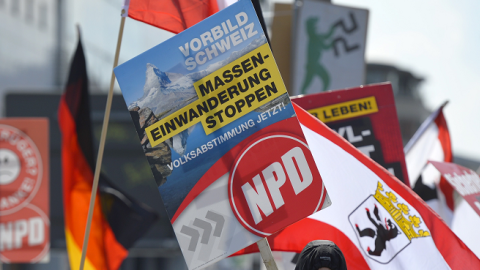The European Parliament’s recent election was highly significant for the far-right movements all across Europe. Many European countries experienced a strong surge of electoral support for what can only be described as far-right parties – and as the recent campaign platforms can attest, a number of these parties are very far to the right. France, Greece, Germany, Denmark, Holland, UK and Finland were obvious examples of this.
Across Europe, two sentiments have driven growing voter support for the far-right platform: dissatisfaction with the European Union (based on the ongoing enlargement of The European Union, while national loss of sovereignty) and a fear that immigration is threatening economic growth. Even the names of the parties reflect an appeal to sovereignty: UK Independence Party (UKIP); the Freedom Party of Austria; and France’s National Front. Compared to the mainstream parties that have dominated the European Parliament, these groups (with newfound success) have embraced nationalism as a major theme that distinguishes them from their brethren on the left and right. And given that the Parliament’s 2014 elections have shown a growing popularity of far-right parties, many voters across Europe feel that their country’s partnership with the European Union has come at the expense of their nation’s individual power.
Critics of the European Union within the far-right have also united on their concerns over open borders between EU members and uncontrolled immigration. Amidst an already bleak economic landscape, high unemployment has compounded fears over the role of foreign workers. Eastern European immigrants have sought employment in western European countries for decades. But the current economic environment has compounded the tension felt by western Europeans as eastern Europeans are securing jobs—whether coveted or not—in their countries.
These concerns have been reflected in the platforms of numerous far-right parties, fueling viewpoints that range from moderate to extreme. Within the National Democratic Party of Germany (NPD), leading party candidates have directly expressed neo-Nazi views. As frightening as it is, NPD has now earned a seat in the European Parliament. Greece’s Golden Dawn is another example of an ultra-nationalist party that has gained support through the European Parliament elections, and is now the third largest party in country with 9% of the votes.
In addition to the above, support of the far-right was also bolstered by a low turnout among those who would traditionally vote mainstream during the European Parliament. With less electoral support, the mainstream parties are easier to challenge, which many far-right parties have proven in this election.
Actual influence or empty threats?
Post-election, we must contend with the question of how this surge of support for the far-right will impact the EU and its citizens. The far-right parties have gained a considerable amount of votes in their respective countries. In both France and the UK, the far-right parties claimed electoral victory and took seats in the European Parliament. Even extremist parties with strong anti-Semitic leanings, such as Hungary’s Jobbik party (who have publically expressed that the country’s Jewish inhabitants should be registered on lists of citizens who pose a threat to national security) received 14.7% of the Hungarian vote.
The frightening prospect of openly neo-Nazi members residing in the European Parliament is now a reality. However, their ability to impact policy across the EU will be limited by their unwillingness to form partnerships with other far-right parties. To achieve any kind of influence, the far-right parties will need to form a “block” of 25 Parliament members from at least 7 different countries. That means parties like Front National and UKIP will need to work together and establish similar priorities—a scenario that seems highly unlikely (since the leader of UKIP Nigel Farage more than once has expressed that there ideology isn’t comparable with Front National). It is also unrealistic that Front National or UKIP would form this block with the far-right parties from Greece and Germany that are openly neo-Nazi, regardless of similar views on immigration and the EU.
What certainly will change is the political rhetoric used in the European Parliament. Many mainstream voters are concerned that the new surge of far-right politicians may bring along extremist views, exposing a new challenge for the European Parliament.
The increase in EU-skeptical votes has also been driven by the financial disparities between the northern and southern European countries, a reality at odds with the EU’s founding ideals of unity and economic security. Countries like Italy and Spain have received enormous financial aid from wealthier EU countries, which has made national sovereignty even more palatable for EU citizens who feel that their country’s wealth is being unwisely dispersed.
While the European Parliament elections have brought attention to fringe political parties across the EU, this trend may not extend to each country’s presidential elections. It can be argued that the increased votes for far-right parties demonstrate that some voters do not believe their concerns are being heard through the European Parliament’s mainstream parties. It is highly unrealistic that these parties will receive as much electoral support on the national level, since a considerable amount of their bond with voters is fueled by concerns with the European Union. To put it simply: this election is a reflection of skepticism towards the governance of the EU, more so than a reflection of new national political movements.
















